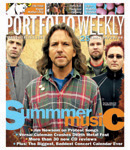Over the course of the last four decades, few rock musicians have been as consistently associated with progressive political causes as have Crosby, Stills & Nash. From the release of their first album in 1969, their repertoire has included a substantial serving of topicality and social commentary. With a presidential election campaign underway, it’s a certainty that the group’s setlist at the nTelos Pavilion on August 1st will contain a generous sampling from that chapter of the songbook.
The threesome’s desire to write meaningful material predated their coming together as a unit. Stephen Stills took Buffalo Springfield into the Top 10 in early 1967 with “For What It’s Worth,” a song inspired by a confrontation between police and youthful demonstrators, whose chorus, “Stop, children, what’s that sound; everybody look what’s going down” perfectly captured the zeitgeist of the era.
David Crosby came from The Byrds, a band whose music was laced with social consciousness, from their choice of Dylan covers to “Turn! Turn! Turn!” and the damning Vietnam War expose, “Draft Morning.” Graham Nash’s split from The Hollies was precipitated by his desire to write and sing songs more substantive than “Stop, Stop, Stop all the dancing, give me time to breathe.”
Their first album together, the eponymous Crosby, Stills & Nash, released at the beginning of the summer of ’69, was a magnificent cornucopia of styles and harmonies. Side two opened with “Wooden Ships,” a song Stills and Crosby had written with Jefferson Airplane’s Paul Kantner about life after a nuclear war.
“We thought if the country kept going in the direction it was going,” Crosby said in the band’s authorized biography, “that it would be intolerable and we weren’t sure if we could stay here. Then we hit upon the idea of these wooden ships that would take the people who thought like us away from all this madness.”
Crosby had another song on the album called “Long Time Gone,” written the night after Bobby Kennedy was shot on June 6, 1968, with the emotional refrain, “and it appears to be a long time before the dawn.” When Déjà Vu appeared the following year, Crosby made another political statement, albeit more obtuse, when he sang “I feel like letting my freak flag fly” in “Almost Cut My Hair.”
The temporary addition of Neil Young to the lineup added “Southern Man” to live shows. When four students were killed by National Guard bullets at Kent State on May 4, 1970, Young poured his feelings into “Ohio,” one of the best known and most unpretentious protest songs of the rock era.
On those first two albums, Graham Nash had come across as a composer of sweet little songs—“Our House,” “Teach Your Children,” “Lady of the Island.” But when he went off to do his own thing, his political side appeared fully formed. “Military Madness” and “Chicago” from his first solo album, Songs for Beginners, were unsparing and unambiguous. His duo albums with Crosby included “Fieldworker” about Mexican migrants and “Wind on the Water,” a gorgeous “save the whales” plaint.
After that first flash of creativity, the recordings by Crosby, Stills & Nash, together and apart, became less focused. Stills included a couple of pertinent rockers on his Illegal Stills album in 1976, “Buyin’ Time” and “Soldier.” Nash wrote “Barrel of Pain (Half-Life)” in opposition to the use of nuclear power. But for the most part, their political message songs became too heavy-handed. American Dream in 1988 included a passel of overproduced protest songs in response to the Reagan era: “Soldiers of Peace,” “Shadowland,” “Nighttime for the Generals.”
Sadly, for the last twenty years, CSN’s occasional recorded output has paled pitifully compared to their initial glory days. Fortunately, their live concerts are mostly a “greatest hits” package. Stephen Stills can still rip off a hot guitar lick, and Crosby and Nash can still hit those sweet harmonies. And when they reprise the best of their most meaningful material, it is still possible to believe in the transformative power of music.
Crosby, Stills & Nash
Friday, August 1 – 8:00 pm
nTelos Wireless Pavilion
393-8181; www.pavilionconcerts.com
copyright © 2008 Jim Newsom. All Rights Reserved. Used by Permission.
